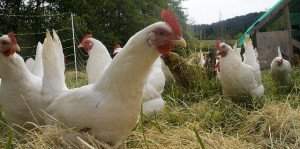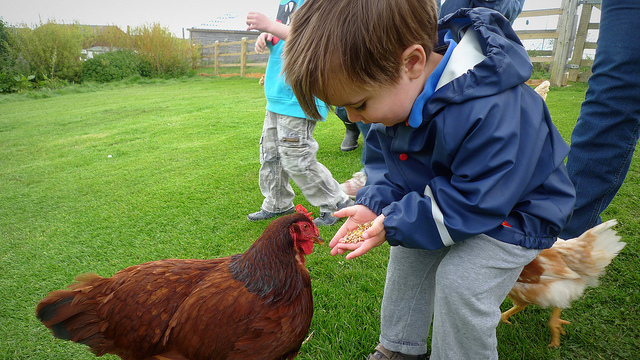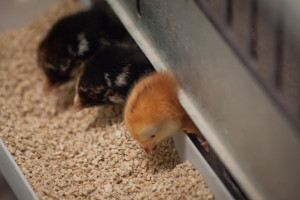If you are wondering what to feed chickens then you are in luck because chickens will eat almost anything (yes even chicken!) so it is important that you offer your backyard chickens a wide variety of food options to maintain a complete and balanced diet.
Click here to get your members only "Guide to Selecting the Best Backyard Chicken Breed"
What to feed chickens – Week 1-6
If you are starting out hatching your own eggs or starting with chicks then you will need a good quality chick starter crumble. If you are raising you chickens mainly for egg production a chick starter will have around 20 percent protein whilst meat bird starter or broiler starter will have between 22 and 24 percent protein.
What to feed chickens – Week 7-22 After the chicks leave the brooder at around 6 weeks of age they can move onto a pullet ration that has a slightly lower protein content until they are around 22 weeks of age or until they begin laying eggs. From this point on your mainstay should be a good quality poultry pellet or layer rations for laying hens.
What to feed chickens – Laying hens After your hens begin laying they need a protein level of 16 to 18 percent. Layer rations are formulated to give your hens the right amount of calcium and minerals and so you shouldn’t need to provide supplements. If you find that your hens are laying eggs with thin shells then you can give your hens extra calcium in the form of crushed oyster shells. Try not to feed layer rations to other types of chickens such as meat birds because the higher mineral content may damage the kidneys of birds that aren’t laying.
What to feed chickens – Meat birds Meat birds can be fed a broiler ration that has a slightly higher protein level between 18 and 20 percent. Ideally you should feed your chickens using a dispenser or feeder to help keep the pellets dry.
Grain (such as wheat and corn) can also be scattered within their environment to augment their diet.
In addition to a good quality poultry pellet, a variety of fresh fruit and vegetables should also be given daily. This can include raw fruits and vegetables such as ….Bok choy, silverbeet, spinach, endive, chickweed, cabbage, vegetable peels and fruit (e.g. banana).
Other foods include table foods and food scraps such as wholemeal rice, rolled oats, cooked pasta, beans, bread and legumes can be offered as well occasionally.
Chickens are extremely sociable animals and hence feeding is a team sport. It is worth monitoring the chickens to ensure the more submissive chickens are getting sufficient nutrition as the dominant birds can tend to exclude the weaker or younger birds.
If you give your birds food scraps try to avoid high fat or high salt foods and never feed your chickens anything that is spoiled.
 Give your backyard chickens access to your yard to forage for weeds, earthworms, and insects to help diversify their diet by free ranging them or using a chicken tractor to move their chicken run to a new part of the garden. You will be rewarded with pest management, weed control, and fertiliser services provided courtesy of your two legged gardening systems.
Give your backyard chickens access to your yard to forage for weeds, earthworms, and insects to help diversify their diet by free ranging them or using a chicken tractor to move their chicken run to a new part of the garden. You will be rewarded with pest management, weed control, and fertiliser services provided courtesy of your two legged gardening systems.
If you are unsure about what to feed your chickens or the safety of a particular foodstuff check with your veterinarian or consult another good quality resource or book. There are however some common foods you should avoid though including Rhubarb, avocado, chocolate, onion, garlic, citrus fruits and lawn mower clippings.
Also make sure that clean water is readily available.


